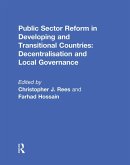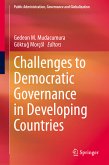Inhaltsangabe:Abstract: The emergence of Information and Communication Technologies (ICT) has launched a global debate (digital or technological revolution) about a paradigm shift from an industrialised towards an Information Society. In the front of this debate lies the assertion that the application of ICT is the impelling factor of transformation which will result in far reaching changes within all parts of the economy, the society and the State. The State plays therefore an important role for this transformation. First, the creation of a "New Economy" which stands for a branch of industry that develops and produces hardware, software and communication equipment and its penetration and application into the whole economy. The emergence of e-buzzwords such as e-commerce or e-business are related to the application of ICT within the economy. Second, after a laissez-faire policy implementation through the State, it has to care for social aspects such as to connect the society to the internet and create a digital literate society. This "second stage" of the Information Society has its expression in the common used catchword "digital divide". Finally, the State itself comes under pressure to apply ICT within government institutions, expressed by the latest catchwords of e-government and e-governance. Their hype (chiefly technologically determined) can be equated with the emergence of the "New Economy" within the global debate about the Information Society. Emerged from developed countries, e-government and e-governance experience an increasing use in developing countries. Their advocates (i. e. international development organisations) stress the catchwords for the purpose of poverty alleviation, improved living standards and economic growth, in developed and particularly in developing countries. Furthermore, both subjects of the thesis have started up a new tractive force within the debate of public administration reforms. Both can be summarised as ICT-led public administration reform. They are deemed to be an ¿impelling factor of organisational change and transformation¿ of governmental institutions. Moreover, the literature concerning both catchwords, is full of positive expectations (i.e. enhance participation, accountability, transparency and overall democracy) and thus, they are seen as a medium to implement and support their theoretical concepts New Public Management (NPM) and Good Governance. Fairly few observations in developed countries [...]
Dieser Download kann aus rechtlichen Gründen nur mit Rechnungsadresse in A, B, BG, CY, CZ, D, DK, EW, E, FIN, F, GR, HR, H, IRL, I, LT, L, LR, M, NL, PL, P, R, S, SLO, SK ausgeliefert werden.
Hinweis: Dieser Artikel kann nur an eine deutsche Lieferadresse ausgeliefert werden.









